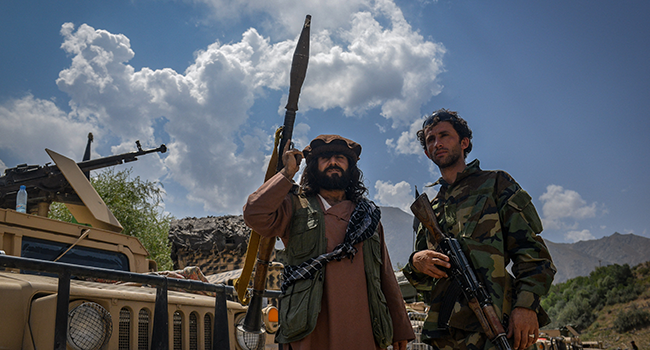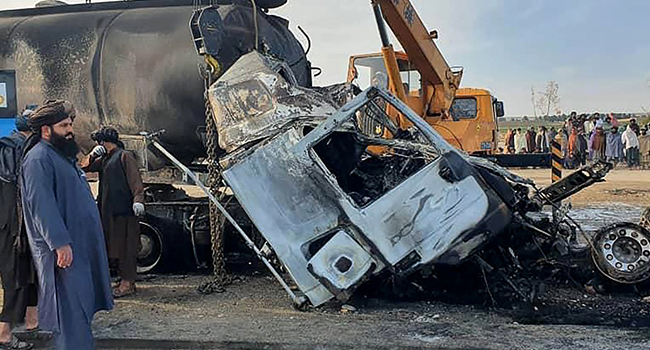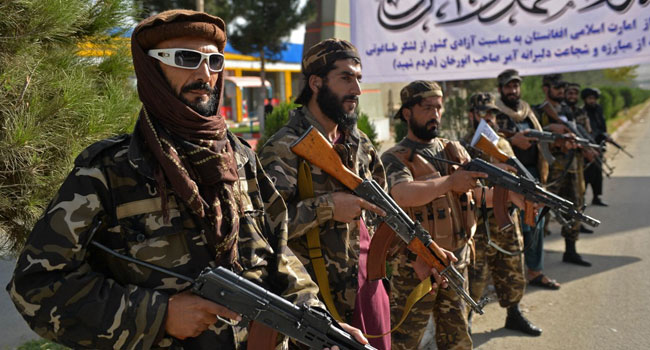
Ahmad SAHEL ARMAN / AFP
Here are the main developments since the Taliban seized Kabul, taking power again in Afghanistan after two decades of war.
– Lightning takeover –
On August 15, Taliban fighters appear on the edge of Kabul after a lightning offensive launched in May as US and NATO troops began to withdraw.
In the space of 10 days, they seized city after city across the country with little or no resistance.
Television images show the Taliban taking the presidential palace.
President Ashraf Ghani flees the country and says on Facebook that the “Taliban have won” and that he left to avoid a “flood of bloodshed”.
– Airport chaos –
Frightened people besiege Kabul airport, the only exit route from the country. Chaos breaks out on the tarmac as people try to rush aircraft.
All military and civilian flights are halted, before resuming Monday evening.
– ‘Terrorism sanctuary’ fears –
China becomes the first country to say it is ready to deepen “friendly and cooperative” relations with the Taliban.
It later accuses Washington of “leaving an awful mess”.
The UN Security Council says the country must not become a breeding ground for terrorism.
Under growing criticism, President Joe Biden insists he has no regrets and emphasises that US troops cannot defend a nation whose leaders “gave up and fled”.
– Go back to work –
The Taliban tell civil servants in Kabul to resume their duties “without any fear”. Some shops reopen and evacuation flights from the city’s airport restart.
– ‘Women can work’ –
At their first news conference since seizing power, spokesman Zabihullah Mujahid says the Taliban will let “women work in accordance with the principles of Islam”.
Girls return to school in Taliban-held Herat.
– EU ‘must talk’ to Taliban –
EU foreign policy chief Josep Borrell says the bloc will have to talk to the Taliban.
– ICC: Possible violations –
Karim Khan, chief prosecutor of the International Criminal Court, says reported crimes during the Taliban advance may amount to violations of international law.
– ‘Collapse’ of Afghanistan –
Russian President Vladimir Putin calls on the global community to prevent the “collapse” of Afghanistan following the Taliban takeover.
NATO says its allies have deployed enough planes to airlift foreign nationals and their Afghan colleagues from Kabul but ground access to the airport is a “big challenge”.
– Taliban leader returns –
Within hours of Taliban co-founder Mullah Abdul Ghani Baradar returning to Afghanistan, the group says it will be “different” this time. It will pardon its enemies and women will not have to wear the all-enveloping burqa.
– ‘Difficult’ airlift –
Biden says he cannot guarantee the final outcome of the emergency evacuation from Kabul’s airport, calling it one of the most “difficult” airlift operations ever.
The US tells its citizens to avoid travelling to the airport because of “potential security threats” near its gates.
Pressure builds on Biden to extend his August 31 deadline to complete the rescue missions, with EU foreign policy chief Josep Borrell saying “it’s mathematically impossible” to complete the evacuations by that date.
– Seven deaths –
Britain’s defence ministry says that seven Afghans died in crowds in Kabul, without giving the circumstances. The previous day Sky News aired footage of at least three bodies outside the airport.
– Taliban blames US –
The Taliban blames the US for the dramatic scenes at Kabul airport, an official saying that “there is peace and calm all over the country, but there is chaos only at Kabul airport”.
– Resistance? –
There have since been flickers of resistance with some ex-government troops gathering in the Panjshir Valley, north of Kabul.
The National Resistance Front is prepared for a “long-term conflict” but is also still seeking to negotiate with the Taliban about an inclusive government, the movement’s spokesman Ali Maisam Nazary tells AFP.
– Taliban fighters –
Hundreds of Taliban fighters are heading to the Panjshir valley “to control it, after local state officials refused to hand it over peacefully”, the group wrote on its Arabic Twitter account.
– ‘Red line’ –
On the 23, the Taliban described the August 31 deadline for evacuations as a “red line”.
On the 24, Biden says he has decided to stick to his August 31 deadline to pull American forces out of Afghanistan, after talks with G7 counterparts.
On the 25, US Secretary of State Antony Blinken says the Taliban will allow Americans and at-risk Afghans to leave after August 31.
– Suicide bombing –
A suicide bomb on August 26 claimed by the Islamic State rips through crowds outside Kabul airport, killing scores of civilians as well as 13 US service members.
The following day, Britain, France and Spain become among the latest countries to end their evacuations from Kabul.
More than 100,000 people have been flown out of the country since August 14, according to the US government.



